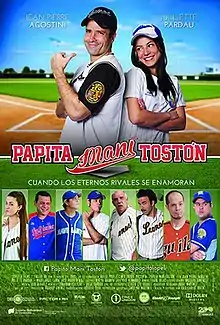Papita, maní, tostón
Papita, maní, tostón is a 2013 Venezuelan comedy film written and directed by Luis Carlos Hueck. Starring Juliette Pardau and Jean Pierre Agostini, it narrates the encounter between two eternal baseball teams rivals, a fan of the Leones del Caracas and another of the Navegantes de Magallanes.[1]
| Papita, maní, tostón | |
|---|---|
 Film poster | |
| Directed by | Luis Carlos Hueck |
| Written by | Luis Carlos Hueck |
| Starring |
|
| Cinematography | Carlos Luis Rodríguez |
| Edited by |
|
Production companies |
|
| Distributed by | Cines Unidos |
Release date |
|
Running time | 115 minutes |
| Country | Venezuela |
| Language | Spanish |
Plot
Andrés (Jean Pierre Agostini) is an inveterate fan of the Leones del Caracas one of the main baseball teams of Venezuela. Julissa (Juliette Pardau) is a fan of Navegantes del Magallanes, the rival team.
One day Andrés mistakenly gets tickets to see the match in the VIP area of Magallanes. There, he meets up with Julissa, who a huge fan of his rival team. Both fall in love but, to be together, they will have to pretend to be of the opposite team to the confusion and annoyance of their relatives and friends, causing the most amusing situations.[2]
Cast
- Jean Pierre Agostini as Andrés
- Juliette Pardau as Julissa
- Miguel Ángel Landa as Abuelo
- Vicente Peña as Eduardo
- Vantroy Sánchez as Ricardo
- Juan Andres Belgrave as Felipe
- José Roberto Díaz as Vicente Gallanes
- Antonieta Colón as Tita
- Elias Muñoz as Camacho Magallanero
- Ana Karina Terrero as Chachi
- Amanda Key as Yesaidu
- Emilio Lovera as Hot Dog seller
- Ruggiero Orlando as Tato
- José Quijada as Augusto
- Mascioli Zapata as Samulo
Reception
The Venezuelan comedy became the highest grossing film in the history of Venezuelan cinema, after reaching 1,350,000 spectators. The news was released by the Centro Nacional Autónomo de Cinematografía (CNAC) through their Twitter account. Luis Carlos Hueck's debut overcame Venezuelan tapes Homicidio culposo, released in 1984, seen by 1,335,252 spectators and Macu, la mujer del policía, released in 1987, seen by 1,180,621 spectators.[3]
References
- "Papita, Maní, Tostón / Take Me Out – Gainesville Latino Film Festival". Retrieved 2020-01-21.
- "NC Latin American Film Festival: 'Papita, Mani, Toston' (Venezuela, 2013)UNC Global". global.unc.edu. Retrieved 2020-01-21.
- notiadmin (2014-05-13). ""Papita, Maní, Tostón", tercera película más taquillera en la historia de Venezuela". Notitarde (in Spanish). Retrieved 2020-01-21.